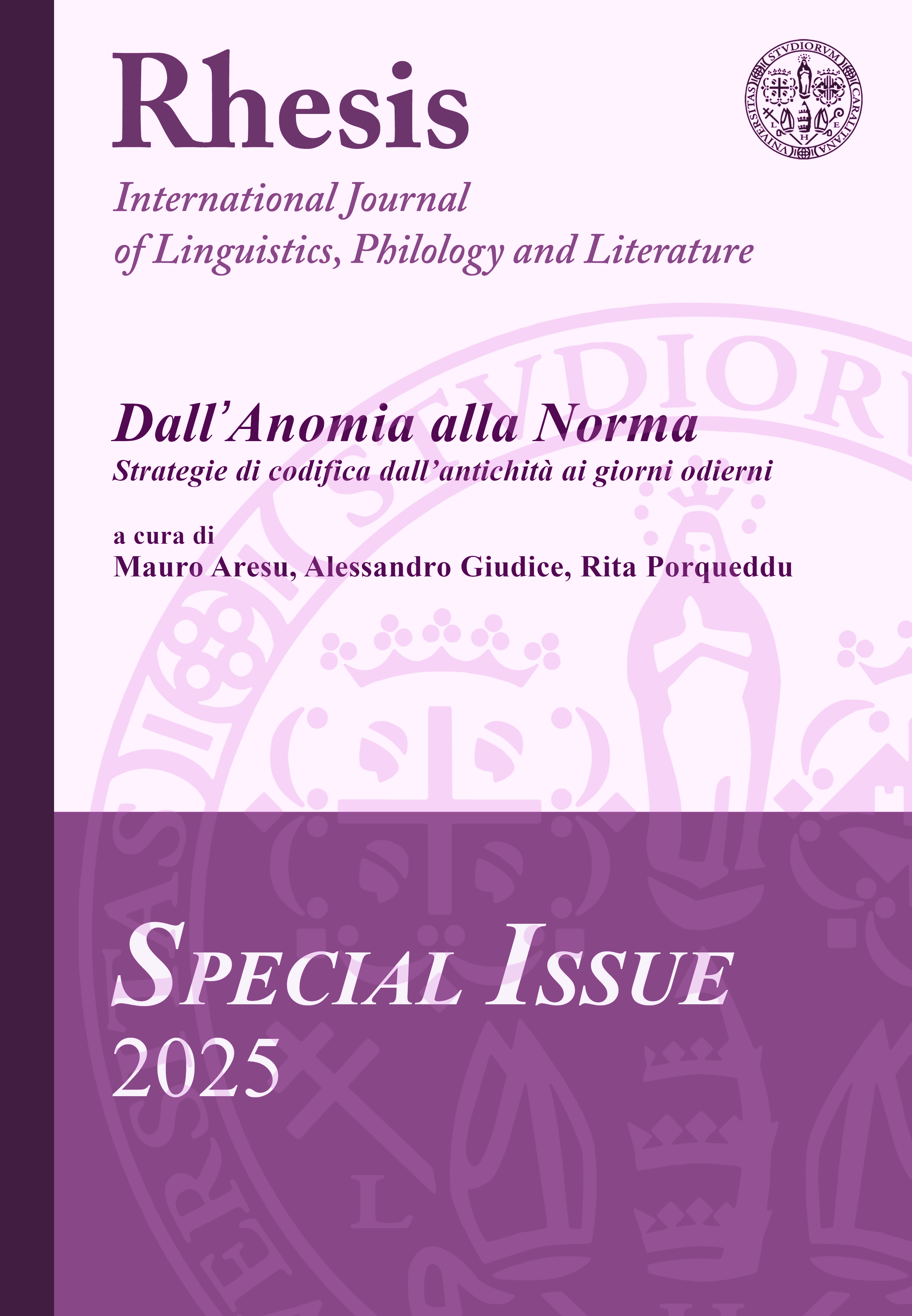The taddhita affixes prescribed for pronominal stems: Analysis of pre-Pāṇinian ātI (A 5.3.34) occurrences
Abstract
The present article can be inserted in a broader line of research, where specific pre-Pāṇinian occurrences of sarvanāmans + taddhita affixes are analysed to show how Pāṇini explains what in appearance was anomie and immediately transforms it into a strict norm. A previous analysis focused on several instances of the affix aka̲C (A 5.3.71), which all the translators of Ṛgveda and Śaunakīya Saṁhitā interpret as ka (A 5.3.70), with a generic diminutive meaning; even though the affix aka̲C can be understood as a pure device created by Pāṇini to deal with an internal sandhi problem in a systematic way, that is, it can be considered equivalent to ka, it is important to also consider what the several meanings aka̲C can bring (see Ferrero 2023). This regulatory process can be found also in the prescription of other taddhita affixes; for this reason, the affixes ātI / enaP / āC (A 5.3.34 – A 5.3.36) have been generally examined in this article. Moreover, some examples of the application of the affix ātI to pronominal stems have been specifically studied in the Vedic saṃhitās. The aim is to understand why Pāṇini needs to introduce these further rules in an already standardised grammatical system.
Downloads
References
Editions and translations
Böthlingk, Otto (ed.) (1887), Pâṇini’s Grammatik. Herausgegeben, übersetzt, erläutert und mit verschiedenen Indices versehen, Leipzig, Verlag von H. Haessel.
Devasthali, Govind Vinayak (ed.) (1968), Sārasiddhāntakaumudī of Varadarāja. Edited with Introduction, Translation, and Critical & Exegetical Notes. Publications of the Centre of Advanced Study in Sanskrit, Cl. C, 4, Poona, University of Poona.
Geldner, Karl Friedrich (ed.) (1951), Der Rig-Veda. Aus dem Sanskrit ins Deutsche übersetzt und mit einem laufenden Kommentar versehen von Karl Friedrich Geldner. 3 vols., Cambridge, Harvard University Press.
Jamison, Stephanie W.; Brereton, Joel P. (eds.) (2014), The Rigveda. The Earliest Religious Poetry of India. 3 vols. New York, Oxford University Press.
Joshi, Shivram Dattatray; Roodbergen, Jouthe Anthon Fokko (eds.) (1991-2011), The Aṣṭādhyāyī of Pāṇini. With Translations and Explanatory Notes, 14 vols., New Delhi, Sahitya Akademi.
Joshi, Sadashiva Shastri (ed.) (2001), Śrīmadvaradarājabhaṭṭhācāryaviracitā laghusiddhāntakaumudī (sūtrāṇāṃ vārtikānāṃ paribhāṣāṇāṃ dhātūnāñca akārādikramasūcikayā pāṇinīyaśikṣā - gaṇapāṭha - sārthaprayogānukramaṇikā - prayogalekhanaprakāraiśca sahitā), Haridāsa Saṃskṛta Granthamālā, 119, Vārāṇasī, Caukhambā Saṃskṛt Sīrij Āphis.
Joshi, Sadashiva Shastri; Jha, Ramacandra (eds.) (1960), Śrīvaradarājācāryaviracitā madhyasiddhāntakaumudī sudhā indumatī saṃskṛtahindivyākhyopetā, Varanasi, Chowkhamba.
Kanshi Ram (ed.) (2010-2012), The Laghusiddhāntakaumudī of Varadarāja. A primer of Pāṇini’s grammar. Translated and elucidated by Kanshi Ram. Edited by Mithilesh Chaturvedi, 3 vols., Delhi, Motilal Banarsidass Publishers.
Katre, Sumitra M. (ed.) (1987), Aṣṭādhyāyī of Pāṇini. In Roman Transliteration by Sumitra M. Katre, Austin, University of Texas Press.
Kielhorn, Franz (ed.) (1880-1885), The Vyâkarana-Mahâbhâshya of Patanjali, 3 vols., Bombay, Government Central Book Depôt.
Kiparsky, Paul (1979), Pāṇini as a Variationist, Publications of the Centre of Advanced Study in Sanskrit, Cl. B, 6, Poona, Poona University Press.
Pancholi, Balkrishna Sharma (ed.) (1966), Śrībhaṭṭojidīkṣitaviracitā vaiyākaraṇasiddhānta-kaumudī, paṇḍitaśrīsabhāpatiśarmopādhyāyaviracitayā lakṣmī vyākhyayopetā, śrībālakṛṣṇa-pañcolinā sampāditā, 2 vols., Delhi, Motilal Banarsidass.
Sharma, Aryendra; Deshpande, Khanderao; D.G. Padhye (eds.) (1969-1970), Kāśikā. A Commentary on Pāṇini’s Grammar by Vāmana & Jayāditya, 2 vols., Hyderabad, Sanskrit Academy, Osmania University.
Sharma, Ram Nath (ed.) (1987-2003), The Aṣṭādhyāyī of Pāṇini, 6 vols., Delhi, Munshiram Manoharlal.
Sontakke, Narayan Sarma; Kashikar, Chintaman Ganesh (eds.) (1933-1951), Ṛgveda-Samhitā. With the Commentary of Sāyaṇācārya, 4 vols., Poona, Vaidika Samshodana Mandala.
Trivedi, K.P. (ed.) (1925-1931), The Prakriyākaumudī of Rāmachandra (in two parts) with the commentary Prasāda of Viṭṭhala and with a critical notice of manuscripts and an exhaustive and critical introduction, Poona, Bhandarkar Oriental Research Institute.
Vasu, Śriśa Chandra (ed.) (1891-1898), The Ashṭadhyayi of Páṇini. Translated into English by Śrīśa Chandra Vasu, 8 vols., Allahabad, Indian Press.
Vasu, Śriśa Chandra (ed.) (1905-1907), The Siddhānta Kaumudī of Bhaṭṭoji Dīkṣita. Edited and translated into English, 3 vols., Allahabad, Panini Office.
Vishva Bandhu (ed.) (1960-1964), Atharvaveda (Śaunaka) with the Padapāṭha and Sāyaṇācārya’s Commentary. Edited and annotated with text-comparative data from original manuscripts and other Vedic works, 5 vols., Hoshiarpur, Vishveshvaranand Vedic Research Institute.
Whitney, William Dwight; Lanman, Charles Rockwell (eds.) (1905), Atharva-Veda Saṃhitā, 2 vols., Cambridge, Harvard University Press.
Witzel, Michael; Gotō, Toshifumi (eds.) (2013), Rig-Veda. Das Heilige Wissen. Erster und Zweiter Liederkreis, vol. I, Berlin, Verlag der Weltreligionen.
Studies
Candotti, Maria Piera (2012), ‘The Role and Import of the Metalinguistic Chapters in the New Pāṇinian Grammars’, in Watanabe, Chikafumi; Desmarais, Michele; Honda, Yoshichika, Saṁskṛta-sādhutā. Goodness of Sanskrit. Studies in Honour of Professor Ashok N. Aklujkar, Delhi, D.K. Printworld.
Debrunner, Albert (1954), ‘Die Nominalsuffixe’, in Wackernagel, Jakob, Altindische Grammatik, Göttingen, Vandenhobck & Ruprecht.
Ferrero, Valentina (2023), ‘Pre-Pāṇinian occurrences of sarvanāman + aka̲c and Pāṇini’s analysis of the meaning of aka̲c’, in Poddighe, Elisabetta; Pontillo, Tiziana (eds.), Resisting and Justifying Changes II: Testifying and Legitimizing Innovation in Indian and Ancient Greek Culture, Pisa, Pisa University Press, 423-442.
Speijer, Jacob Samuel (1886), Sanskrit Syntax, Leyden, E.J. Brill.
Whitney, William Dwight (1896), A Sanskrit Grammar, including both the classical language, and the older dialects, of Veda and Brahmana, Leipzig, Breitkopp & Härtel.



